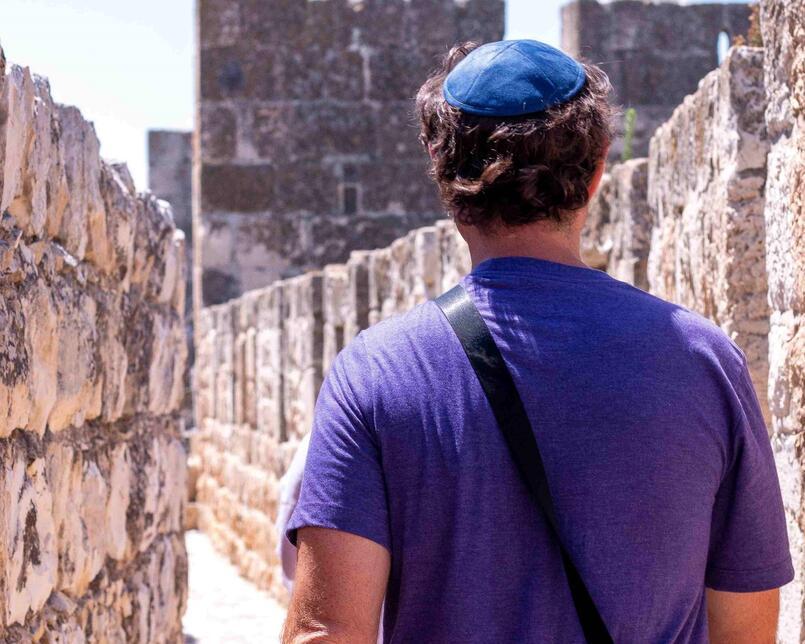From kosher food products and Jewish culture to life-changing educational experiences and sifrei kodesh, Israel suffuses Jewish life in the Diaspora, and Jewish communities around the world would be immeasurably poorer without it.
Dr Jonathan Boyd
and test your family's knowledge of Jews worldwide while reading the Haggadah!
Dr Jonathan Boyd
The transition from the solemnity of Yom HaZikaron to the joy of Yom Ha’Atzmaut is always hard. It was designed to be so. Israel’s first government wanted people to feel the dissonance between the wonder of Israel’s existence and the price Jews paid for it. Israel’s independence was only achieved through tremendous sacrifice and loss of life, so Israel’s Independence Day had to be directly preceded by Israel Memorial Day – a public acknowledgement and commemoration of those who gave their lives to establish the State in the first place.
But this year, the tension between the two days feels greater than ever. In many respects, every day since October 7 has felt like Yom HaZikaron – the pain remains as potent as it did seven months ago. One Israeli educator recently captured the national mood perfectly: “We’re not suffering from PTSD because we’re not post-trauma yet. We’re still in the middle of it,” she said. How does one celebrate when so many are still dying and being held captive?
For me, the tone over both days this year will be far more reflective than usual. The lives lost feel closer than ever, more visceral, more personal. But the appreciation for what Israel is – what it has given to Jews everywhere, what role it plays in Jewish life, how critical it is to the future of the Jewish People, has also come into ever sharper focus following the horrors of October 7 and the subsequent war.
Here’s the thing: At JPR, we monitor closely how Jewish populations worldwide are changing – most fundamentally, whether they are growing or declining, and why. And when I look at the global demographic data on Jews, Israel is one of the very few anomalies. Its Jewish population is growing – not so much because of immigration, but because of fertility. And that’s not just because of high birth rates among Haredi Jews; it’s because all Israelis, even the most secular, have more children than their equivalents in the Western world.
Israeli women have about three children each on average; by contrast, total fertility rates across Europe and the West are all below replacement level – they range from 1.2 in Ukraine and Italy, through 1.6 in the UK, to 1.9 in France and Iceland. While Western Jewish rates tend to be higher than the national average in each country, most Jewish populations are still in a state of decline. The combined forces of low fertility, ageing and assimilation are just too powerful. In simple terms, without Israel, the global Jewish population would likely be in freefall, save perhaps for the Haredi sector.

I say “perhaps” because the absence of Israeli industry, creativity and religiosity would further exacerbate this demographic collapse. Jews don’t always recognise it, but Israel shapes vast swathes of Jewish life in the Diaspora – from kosher food products to Jewish music, art, literature and television, and from life-changing Jewish educational experiences to sifrei kodesh and numerous items of Judaica. Israel suffuses Jewish life in the Diaspora; Jewish communities around the world would be immeasurably poorer without Israel’s presence or contribution.
The events of October 7, the subsequent war in Gaza, and the dramatic rise in antisemitism that we have witnessed in recent months have shaken many Jews worldwide to their core. For some, the loss of Palestinian Arab life at the hands of the IDF has been too much to bear, and they are struggling deeply to reconcile their understanding of what Jewishness is with the images of death that litter their screens. For others, the heinous attacks of October 7 and the callous and cynical way in which the enemies of Israel have worked to demonise it only reinforces their resolve to use whatever means possible to defend the country. For still others, the past seven months have thrown up numerous moral, psychological and social challenges, creating a daily mix of thoughts and emotions that are disconcerting, distressing and destabilising.
But whatever position Jews take on the war – and we’ll learn much more in our forthcoming Jewish Current Affairs survey – we’d do well to take a moment this Yom Ha’Atzmaut to appreciate just how significant a role Israel has played in Jewish life for the past 76 years. In many respects, it is impossible to measure – very fortunately, we do not have the counterfactual of a contemporary world without a Jewish State to do so. But whatever political positions Jews worldwide take, and irrespective of whether they realise it or not, they need Israel to help sustain Jewish life today. Israeli leaders would do well to ponder on this, too – they hold something profoundly precious in their hands, and how they manage it will have profound implications for the future of Jews everywhere.
Executive Director
Executive Director
Jonathan has been Executive Director of JPR since 2010, having previously held research and policy positions at the JDC International Centre for Community Development in...
Read more